BREAST CANCER TREATMENT OPTIONS: A COMPREHENSIVE GUIDE.
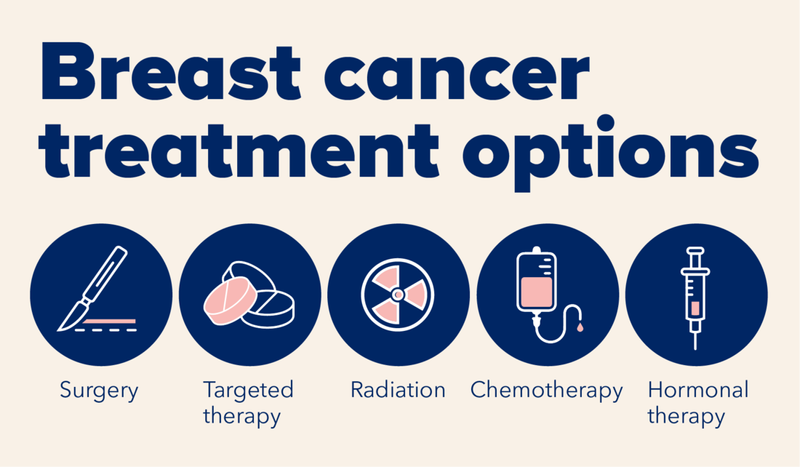
Breast cancer is one of the most common cancers affecting individuals worldwide. With significant advances in medical science, there are now a variety of treatment options available. This comprehensive guide explores these options, helping you understand each one and how it can impact your treatment journey.
WHAT IS BREAST CANCER?
Breast cancer begins when cells in the breast start to grow uncontrollably. It can develop in different parts of the breast, including the ducts (which carry milk to the nipple) or lobules (which produce milk). The cancer can be classified into different types, such as invasive ductal carcinoma and invasive lobular carcinoma, each requiring a specific approach to treatment.
PRIMARY TREATMENT OPTIONS FOR BREAST CANCER.
1. Surgery

Surgery is often the primary method for treating breast cancer. The main goal is to remove the tumor and any surrounding tissue that might be affected.
- Lumpectomy: This surgery involves removing the tumor and a small margin of surrounding tissue. It is generally recommended for early-stage breast cancer and aims to preserve as much of the breast as possible. Following a lumpectomy, patients usually undergo radiation therapy to kill any remaining cancer cells.
- Mastectomy: This procedure involves removing one or both breasts. A total mastectomy removes the entire breast, while a partial mastectomy removes only a portion of it. Mastectomy may be considered for larger tumors or when there is a high risk of recurrence. This option may also be recommended if there are multiple tumors in different areas of the breast.
- Sentinel Node Biopsy: During this procedure, a few lymph nodes are removed and examined to determine if the cancer has spread beyond the breast. This helps in staging the cancer and deciding on further treatment.
REFERENCES:
- American Cancer Society. (2023). “Breast Cancer Surgery.” Link
- Mayo Clinic. (2023). “Mastectomy.” Link
2. Radiation Therapy
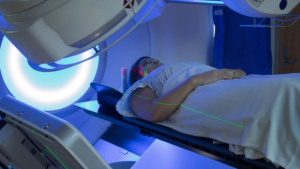
Radiation therapy uses high-energy rays to target and destroy cancer cells. It is commonly used after surgery, particularly after a lumpectomy, to eliminate any remaining cancer cells in the breast.
- External Beam Radiation: This type of radiation involves a machine that directs beams of radiation to the affected area from outside the body. It is the most common form of radiation therapy.
- Brachytherapy: Also known as internal radiation, this involves placing a radioactive source inside or very near the tumor site. It is often used as a supplementary treatment after external beam radiation or for specific cases of breast cancer.
REFERENCES:
- National Cancer Institute. (2023). “Radiation Therapy for Breast Cancer.” Link
- Breastcancer.org. (2023). “Types of Radiation Therapy.” Link
3. Chemotherapy

Chemotherapy uses drugs to kill cancer cells or stop them from growing. It is usually recommended for more advanced stages of breast cancer or when there is a high risk of the cancer spreading.
- Systemic Chemotherapy: These drugs are administered orally or intravenously and travel through the bloodstream to reach cancer cells throughout the body. This treatment is often used before surgery (neoadjuvant therapy) to shrink tumors or after surgery (adjuvant therapy) to reduce the risk of recurrence.
- Targeted Chemotherapy: This approach involves drugs that specifically target cancer cells with certain characteristics, which helps minimize damage to normal cells.
References:
- Cancer Research UK. (2023). “Chemotherapy for Breast Cancer.” Link
- National Comprehensive Cancer Network. (2023). “Breast Cancer Treatment Guidelines.” Link
4. Hormone Therapy
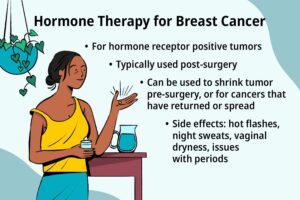
Hormone therapy is used for cancers that are hormone receptor-positive, meaning they grow in response to hormones like estrogen or progesterone. This treatment works by blocking the body’s natural hormones or lowering their levels.
- Selective Estrogen Receptor Modulators (SERMs): Drugs like tamoxifen fall into this category. They work by blocking estrogen from binding to its receptor on cancer cells, thereby inhibiting their growth.
- Aromatase Inhibitors: These drugs reduce the amount of estrogen produced by the body. They are commonly used in postmenopausal women.
- Estrogen Receptor Downregulators: Medications like fulvestrant lower the number of estrogen receptors on cancer cells, which helps to prevent cancer growth.
REFERENCES:
- Breastcancer.org. (2023). “Hormone Therapy for Breast Cancer.” Link
- American Society of Clinical Oncology. (2023). “Hormone Receptor-Positive Breast Cancer.” Link
5. Targeted Therapy
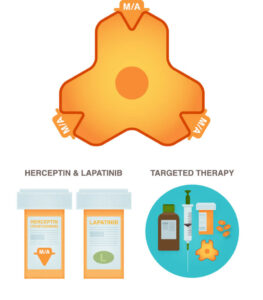
Targeted therapy involves drugs that specifically target cancer cells with particular genetic markers or proteins, minimizing damage to normal cells.
- HER2-Targeted Therapy: For cancers that overexpress the HER2 protein, drugs like trastuzumab (Herceptin) target this protein to help manage the disease. HER2-positive cancers tend to be more aggressive, and targeted therapy can be particularly effective.
- CDK4/6 Inhibitors: These drugs, such as palbociclib, interfere with the cancer cell cycle, preventing them from dividing and growing. They are used in combination with hormone therapy for certain types of breast cancer.
REFERENCES:
- National Cancer Institute. (2023). “Targeted Therapy for Breast Cancer.” Link
- Susan G. Komen Foundation. (2023). “Targeted Therapy for Breast Cancer.” Link
6. Immunotherapy
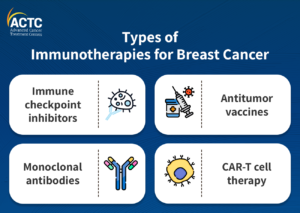
Immunotherapy is a newer approach that helps the body’s immune system recognize and attack cancer cells. While still being studied for breast cancer, it shows promise for certain types of the disease.
- Checkpoint Inhibitors: These drugs block proteins that prevent the immune system from attacking cancer cells. By inhibiting these proteins, checkpoint inhibitors help the immune system target and destroy cancer cells.
- Cancer Vaccines: These are designed to stimulate the immune system to attack cancer cells specifically. Although not yet a standard treatment for breast cancer, research is ongoing to evaluate their effectiveness.
REFERENCES:
- American Cancer Society. (2023). “Immunotherapy for Breast Cancer.” Link
- National Comprehensive Cancer Network. (2023). “Immunotherapy for Breast Cancer.” Link
MAKING AN INFORMED DECISION.
Choosing the right treatment plan for breast cancer is a personal decision. It involves considering various factors, including the type and stage of cancer, overall health, and personal preferences. Working closely with your healthcare team is essential to develop a treatment plan tailored to your specific needs.
In addition to medical treatments, support services play a crucial role in managing the emotional and physical aspects of breast cancer. Counseling, nutrition advice, and support groups can provide valuable support throughout the treatment process.
CONCLUSION.
Breast cancer treatment options have evolved significantly, offering a range of effective therapies. From surgery and radiation to chemotherapy, hormone therapy, targeted therapy, and immunotherapy, each treatment has its place in managing the above mentioned cancer. Understanding these options and discussing them with your healthcare team will help you make informed decisions and navigate your treatment journey more effectively.
Additionally with ongoing research and advancements in treatment, there is hope for more effective and personalized therapies in the future. These developments aim to improve outcomes and enhance the quality of life for those affected by the cancer.
REFERENCES: